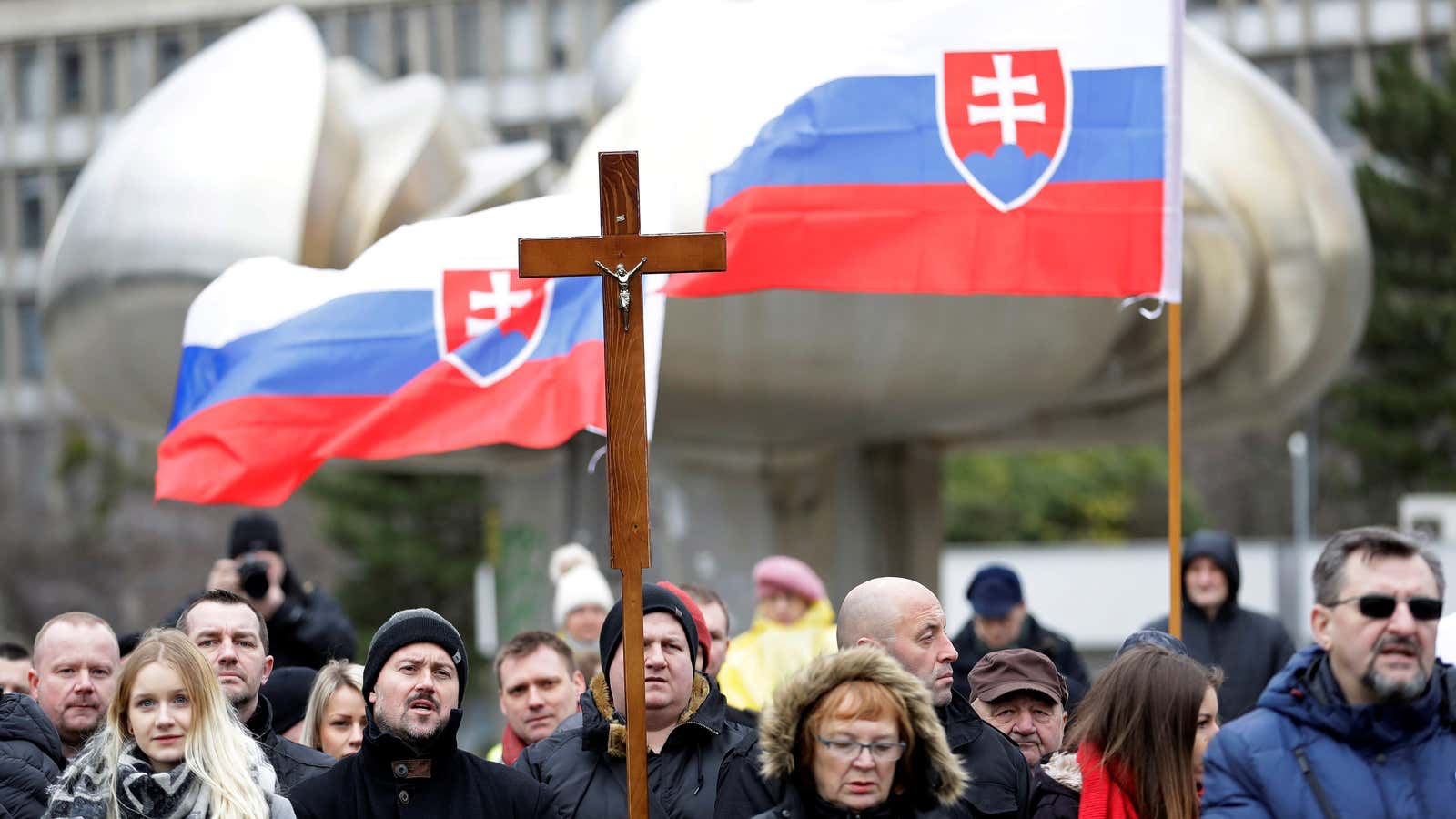In elections around the world, a familiar pattern is emerging.
It usually goes something like this: To the surprise of the establishment, a fringe party rises in the polls, appealing to populist sentiments and a frustration with the status quo. Everyone worries about it, but not overly. After all, the political landscape has for decades been dominated by the usual parties. Then, the extremist party pulls off a surprise victory. In the mea culpa that ensues, pundits will say the elites failed to listen to the silent majority of voters who felt they’d been left behind—by globalization, the European Union, you name it.
Slovakia, a Central European country that’s been part of the EU since 2004, now looks set to follow this trend. On Feb. 29, Slovakians will elect 150 members of the country’s parliament. Polls show the incumbent Social Democratic party leading, with a projected 17% to 20% of the popular vote. But not far behind, with 10% to 12%, is the People’s Party-Our Slovakia, a far-right group led by neofascist politician Marian Kotleba.
The party’s success could have far-reaching implications for Slovakia’s young democracy, and for the populist tide sweeping through Europe.
In a class of its own
In recent years, far-right parties have joined governments across Europe in what some have called a populist wave. This has been especially true in the Central European countries of Poland, Czechia, Hungary, and Slovakia.
Aliaksei Kazharski, a researcher at Comenius University in Bratislava, wrote in a 2017 paper that since the 2013 European migrant crisis, political elites in these countries have been building new identities to counter the liberalism of Western Europe. “These new identities favor a culturalist, conservative interpretation of the nation and reject humanitarian universalism, epitomized by the European Union’s decision to welcome the refugees,” he wrote.
And while other ultraconservative and ultranationalist parties have made gains in Slovakia in recent years—including the Slovak National Party and the We Are Family Party, now polling at 5% and 7%, respectively—the People’s Party stands in a class of its own.
Marian Kotleba, the head of the People’s Party, openly admires Jozef Tiso, who was the leader of Slovakia’s Nazi-allied state. Tiso was executed for war crimes in 1947 after he sent more than 70,000 Slovakian Jews to their death in concentration camps. Kotleba unsuccessfully ran for president last year and, according to Reuters, is now on trial for handing out social subsidy checks to poor families for €1,488, “a number used by extremists to represent white supremacism and a Nazi salute.”
Miroslava Sawiris, a researcher who tracks online disinformation in political campaigns at the Bratislava-based think tank GLOBSEC, said that even in the European Parliament, where a far-right bloc controls 10% of seats and the People’s Party has one elected representative, “they are isolated because this party is extreme, even for the other far-right parties” in Europe.
The party’s platform, officially called the “Ten Commandments,” includes the following proposals:
The election
For years, the left-leaning Social Democrat party has dominated Slovakian politics. But trust in the party has eroded due to accusations of corruption and ties government officials had to the murder of an investigative journalist and his fiancée.
These scandals help explain why the virulent anti-corruption and anti-establishment message of the People’s Party seems to be resonating with Slovakian voters. In fact, says Martin Reguli, a senior analyst at the Bratislava-based F.A. Hayek Foundation, “a lot of what is going on right now is a referendum on their record.” In the latest Eurobarometer survey, 70% of Slovaks said they didn’t trust their national parliament or their government.
Sawiris says social media platforms, especially Facebook, have also played a role.
“The unregulated landscape that they offer is contributing towards this radicalization and polarization of people in Slovakia,” she said. The People’s Party was able to “build up a very efficient network of related pages on Facebook…and what they offer is basically a constant stream of anti-campaign for all the other parties and very strong propaganda machine for this particular party.”
As a result, the party has grown in popularity. It got more than 8% of the vote in the last parliamentary election in 2016, and more than 12% of the vote in the 2019 European Parliament election, propelled by central and northern districts with high levels of unemployment, and which are home to large settlements of Roma (pdf), a large ethnic minority in Europe that has long been a favorite scapegoat of far-right parties. There are about 400,000 Roma living in Slovakia.
“Around a third of the Roma people in Slovakia live in extreme poverty, and they present an easy image for the ‘other,’” said Pavol Hardoš, a lecturer at the Institute of European Studies and International Relations at Comenius University.
The People’s Party has so far failed to poll higher than 14% ahead of the upcoming general election. But analysts say that, depending on turnout and the performance of smaller groups in the upcoming election, more mainstream parties may have to ally themselves with the People’s Party—even though all the major parties that make up the current parliament have ruled that out.
Reguli said that even if the party performs worse than expected on election day, their ideas have already successfully entered the mainstream. Last year, members of the Slovak National Party proposed a bill that would have forced women seeking an abortion to first listen to the fetal heartbeat and look at ultrasound images of the fetus. (The bill was rejected.) And officials say that an amendment to the constitution passed in 2014 defining marriage as “the unique bond between one man and one woman” has institutionalized homophobia.
“The danger isn’t necessarily from Kotleba and his party,” Hardoš said. “The danger is that his ideas, or the ideas of the radical right, are already very much normalized in Slovak discourse.”
